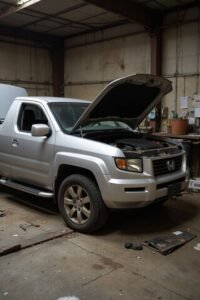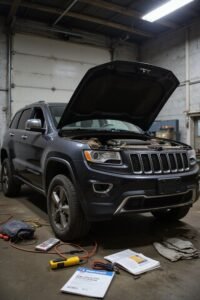You’ll want to steer clear of the Volkswagen Tiguan models from 2009-2013 and 2019, which have significant mechanical and electrical problems. These years are plagued by premature timing chain failures, transmission issues, and serious safety concerns including airbag defects. The 2019 model specifically faces widespread electrical problems and transmission troubles. With repair costs averaging $730 annually, understanding these trouble spots can save you thousands in unexpected repairs.
The Most Problematic Tiguan Years at a Glance
Three model years of the Volkswagen Tiguan stand out as particularly problematic: 2010, 2012, and 2013. In Volkswagen history, these years marked significant reliability challenges that impacted the Tiguan market. The 2010 model suffered from fuel system failures, rough idling, and engine carbon buildup issues. The 2012 and 2013 models shared persistent cooling system problems, with water pump failures and engine overheating being common complaints. Similar to other VW models like the Golf GTI, these Tiguan years faced high-pressure fuel pump failures. All three years experienced critical safety concerns related to airbag clock spring defects and electrical system malfunctions. Additional issues included transmission problems, brake system faults, and interior component failures. Much like the lifter failures plaguing Chevy’s AFM system, these recurring problems led many potential buyers to avoid these model years entirely. If you’re shopping for a used Tiguan, these model years deserve extra scrutiny due to their documented mechanical and safety concerns. Later models from 2014 onwards showed considerable improvement with their 2.0L TSI turbocharged engines delivering more reliable performance.
Critical Engine Problems in 2009-2011 Models
While the 2009-2011 Volkswagen Tiguan models showcased VW’s innovative EA888 2.0-liter engine platform, these years revealed serious mechanical vulnerabilities that could lead to catastrophic engine failure.
The most critical issue you’ll encounter is premature timing chain and tensioner wear, which can cause sudden engine stalling or complete breakdown. You’ll also face persistent problems with the intake manifold and PCV system, leading to carbon buildup and misfires. The water pump’s thermoplastic construction often fails early, sometimes before 20,000 miles, while turbocharger degradation and excessive oil consumption compound these issues. If you’re considering one of these models, be aware that fuel system vulnerabilities can trigger stalling and rough idle conditions, especially in cold weather. These models rank particularly low with a 3.0 out of 5.0 reliability rating, indicating significant maintenance concerns.
Electrical System Failures That Plague Early Tiguans
Throughout early Tiguan models, electrical system failures created widespread disruption across multiple vehicle functions. You’ll encounter issues ranging from malfunctioning infotainment systems to complete power losses that leave your vehicle temporarily inoperable. Regular diagnostic system checks can help identify potential electrical issues before they escalate into major problems. The Terminal 15 relay proves especially problematic, causing electrical glitches that affect lighting, starting controls, and critical systems.
Watch for dashboard warnings that reset unexpectedly, along with parasitic battery drains that can leave you stranded. Even with a healthy battery, you might see charging system warnings due to alternator and voltage regulator issues. The central electrical control unit often triggers cascading failures across multiple modules, requiring complex repairs beyond simple battery replacement. These electrical problems typically manifest after the vehicle sits idle, suggesting deeper issues with power distribution components.
Transmission and Drivetrain Issues to Watch For
Several critical transmission and drivetrain problems plague specific Volkswagen Tiguan model years, with the DSG transmission issues being particularly troublesome in mid-2010s vehicles. You’ll need to watch for jerky shifts, hesitation, and delayed responses – key transmission indicators that something’s wrong. The 2018 model year stands out for gear slippage and acceleration issues, while 2009-2011 models suffer from timing chain tensioner failures that can destroy engines.
If you’re considering a Tiguan with AWD, inspect the differential and driveshafts for unusual noises during acceleration. Proper drivetrain maintenance is vital – DSG transmissions require oil changes every 40,000 miles, and ignoring this schedule can lead to costly mechatronic unit failures. Don’t overlook early warning signs like shuddering or delayed shifting. Similar to the Jeep Renegade’s 9-speed automatic transmission issues, these symptoms often require more than just software updates to fully resolve.
Cooling System Defects and Overheating Risks
The cooling system in Volkswagen Tiguan models demands careful attention, particularly in 2017 and later models where overheating issues have surfaced. You’ll need to watch for common overheating symptoms including unexplained temperature spikes, especially during highway driving, and coolant leaks around the water pump or radiator.
The most frequent culprits are faulty thermostats, failing water pumps, and malfunctioning cooling fans. Your Tiguan’s water pump can develop shaft seal leaks or bearing wear, while the thermostat may stick open or closed, disrupting proper coolant regulation. To minimize these risks, follow these maintenance tips: regularly check coolant levels, inspect for visible leaks, and guarantee proper coolant type and mixture ratios. When overheating persists, you’ll need professional diagnostics to rule out serious issues like head gasket failure.
Safety Concerns and Recall History
Beyond cooling system challenges, Volkswagen Tiguan models have faced significant safety-related recalls across multiple production years. The 2026 Tiguan’s loose rear tie rod bolts and the 2022-2024 models’ rearview camera software failures highlight recent recall impacts. You’ll need to watch for critical brake system issues in 2022 models, where loose brake pipe nuts can compromise stopping performance.
Earlier Tiguan generations from 2012-2016 underwent safety upgrades due to regulatory compliance concerns, while 2009-2014 models experienced fuel system problems causing engine misfires. The 2015 model year faced certification label issues affecting tire pressure and weight limits. When shopping for a Tiguan, it is crucial to verify that all recall repairs have been completed, particularly for steering, braking, and fuel system components.
Cost Analysis of Common Repairs
Maintaining a Volkswagen Tiguan demands significant financial planning, with annual repair costs averaging $730 – roughly 40% higher than typical compact SUVs. Your repair cost breakdown shows major components like timing chain tensioner replacement ($1,462-$1,950) and fuel pump repairs ($960-$1,054) represent the costliest fixes you’ll face.
A maintenance cost comparison reveals that while initial five-year costs run $2,589 – lower than segment averages – expenses escalate dramatically with age. You’ll notice repair probabilities jumping from 2.33% in year one to 23.55% by year ten, with annual costs climbing to $1,226. The most concerning aspect is the repair severity pattern, where major repairs become increasingly likely after year ten, exceeding 35% probability by year eleven.
Making an Informed Buying Decision
Armed with repair cost data, you’ll need to identify which Volkswagen Tiguan model years present the highest risk for potential buyers. Based on reliability ratings and documented issues, avoid the 2009-2011 models due to timing chain failures and the 2019 model year due to widespread electrical, engine, and transmission problems. Much like the ECM failures in early 2000s Toyota RAV4s, electronic issues can lead to costly repairs.
When evaluating a used Tiguan, prioritize 2015 and newer models while steering clear of the problematic 2019 year. Key buying tips include checking service records for water pump replacements, suspension wear, and software updates. Pay special attention to recall compliance, particularly for 2016-2018 models with tow bar issues and 2019 units with brake system concerns. Consider having a certified mechanic inspect any potential purchase for these known trouble spots. Like the Nissan Rogue’s CVT transmission failures, transmission issues can lead to expensive repairs that significantly impact ownership costs.



